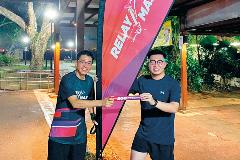No one would begrudge the current crop of graduands for feeling a little shortchanged. At the start of the 2019/2020 academic year, there was one date above all others that they had been looking forward to: Commencement in July, that rite of passage honouring their scholastic achievements, when black caps
are tossed, balloons are dropped, and hugs are shared with proud families and friends. Sadly, those celebrations have been scuppered by the COVID-19 pandemic, as NUS has postponed the ceremony to January 2021 to prioritise the community’s safety and well-being.
This news has dealt a big blow to graduands as well as the University, which is marking its 115th anniversary this year. With such a long and storied history, NUS has accumulated many traditions and signature events. While COVID-19 has recently disrupted some of these, different generations of students and alumni have also adapted existing traditions or invented new ones of their own accord. But no matter what shape or form these traditions take, they all reflect and reinforce the University’s values — innovation, resilience, excellence, respect and integrity.
 DID YOU KNOW?
DID YOU KNOW?
NUS revamped its graduation ceremony in 2000. Formerly called “Convocation”, it was renamed “Commencement” to signify a fresh
start for graduating students. The event was also moved back to
campus at the newly-built University Cultural Centre.
ROOTED IN GIVING
Traditions are, by definition, handed down from one generation to the next. That said, an event or practice does not become a tradition merely because it has been done for a long time. “In the university context, traditions are how we go about instilling values into graduates, and making them feel loyal and committed to their alma mater. University traditions are grounded in the belief of what we are supposed to be doing,” says Professor Lim Pin, NUS’ longest-serving Vice Chancellor from 1981 to 2000.
Going all the way back to 1905, NUS was founded as a “by the community, for the community” medical school. Its raison d’être was to produce medical professionals to ensure the health and well-being of Singaporeans. More than a century later, NUS has grown into a world-class institution with talent across varying disciplines, and has not lost this tradition of service to country and society.
One of the oldest and best-loved manifestations of this spirit of giving is the NUS Students’ Union (NUSSU) Rag & Flag, an annual event to raise funds for those in need. NUSSU, then called the University of Malaya Students’ Union (UMSU), organised the first-ever Rag & Flag in November 1957, in conjunction with the inaugural Students’ Welfare Week. Some 100 student volunteers fanned out across the island with tin cans to collect donations from the public, while others put on a float parade and performances on the same day as a way of thanking the public for their contributions. “I remember working late into the night with three other students as we cut open the tin cans and counted the money, in the safety of the Central Police Station at Beach Road,” recalls UMSU’s then-General Secretary, Mr Donald Wyatt (Arts ’60). “Together with another student leader, I also crossed the Causeway to present a cheque to one of the beneficiaries, the Johor State Welfare Committee’s Project for Crippled Children. It felt satisfying to have done something meaningful.” He would go on to become the UMSU President in 1959.
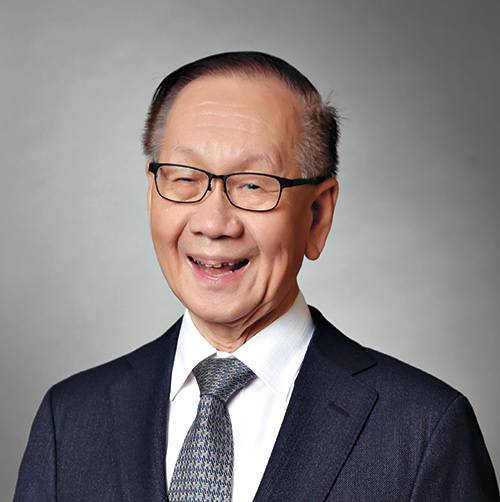
In the university context, traditions are how we go about instilling values into graduates, and making them feel loyal and committed to their alma mater.
Professor Lim Pin, former NUS Vice Chancellor
On the Rag side, there has been greater interest in hosting Rag Day off campus and closer to the general population. Previous venues have included the Padang (2007), The Promontory on National Day (2011), and the Floating Platform as part of SG50 celebrations (2015). For the first time, Rag Day was held in
the heartlands at Bishan–Ang Mo Kio Park last year. “Rag & Flag has always been about engaging with Singaporeans from all walks of life. What better way to engage residents than to hold Rag Day in a place easily accessible to them, at their doorstep?” says Arts and Social Sciences Year 3 student Ms Kimberley Aw, who served as NUSSU Rag Day 2019 Project Director.
The fact that Rag & Flag has flourished through the decades fills Mr Wyatt with pride. “I never imagined
Rag & Flag would continue as long as it has. It shows that NUS students are conscious of their links to community and country,” he says. In times like these, when COVID-19 has left many people both within
and beyond our borders in need of help, drawing on this tradition of community service is all the more important.
HOME AWAY FROM HOME
Not all students live on campus during their time at NUS. But for those who do, memories of Hall life — and participating in the co-curricular activities (CCAs) and traditions unique to each Hall of Residence — are usually the ones that linger most vividly.
Just ask Professor Lawrence Chia (Science ’69). Though never a student resident himself, Prof Chia has had a long association with Dunearn Road Hostels/Sheares Hall (DRH/SH), which was founded in 1952. He first served as Non-Resident Fellow (1968–1969) and then Master (1970–1981) of DRH at College Green. After DRH moved to Kent Ridge Campus and was renamed Sheares Hall, he stayed on as Master until 2003. “Hall life centred around friendships, fun and food, like going out together for supper and holding National Day celebrations. Loyalty to one another and the Hall was enhanced, and built upon to also encompass the University and the wider community through welfare projects such as blood donation drives,” says Prof Chia, 83. “Personally, serving in the Hall all those years added a special dimension to my academic career. The close relationships and mutual respect between students and staff resulted in lifelong friendships.” This family atmosphere and concern for others is still very much evident. In 2009, the DRH/SH Alumni Bursary Fund was set up by older Shearites to enable financially-challenged students to stay in the Hall. Twice-yearly blood donation drives are still kept up, and the DRH initials are preserved in Sheares Hall’s motto, “Dare to Reach the Highest”.
![]()
I never imagined Rag & Flag would continue as long as it has. It shows that NUS students are conscious of their links to community and country.
Mr Donald Wyatt, senior alumnus and founding committee member of Rag & Flag
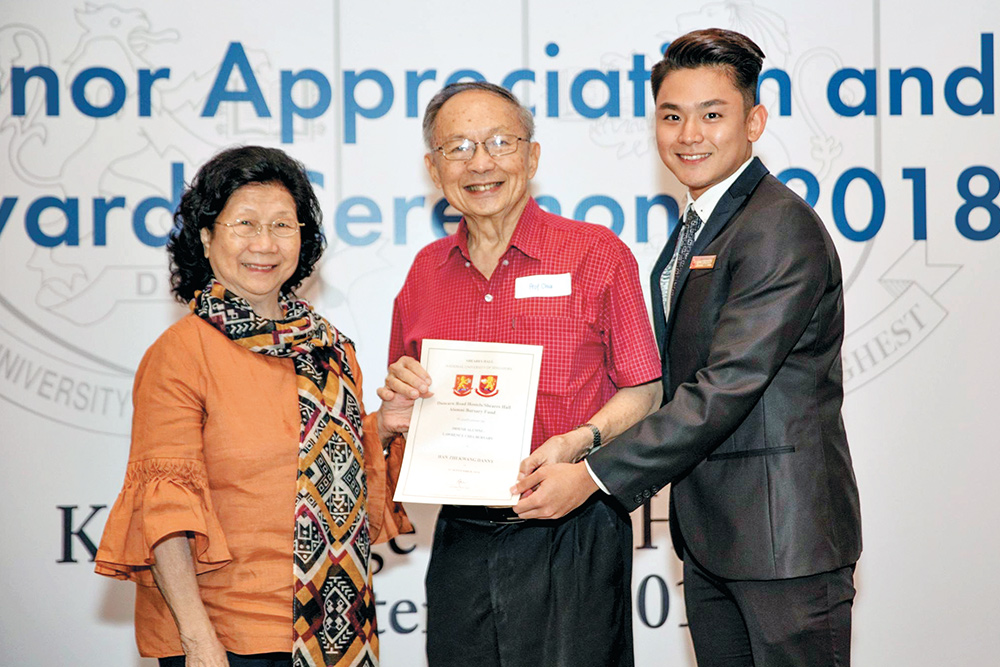 Professor Lawrence Chia (middle) and his wife presenting a DRH/SH Alumni Bursary certificate to bursary recipient Mr Danny Han on 21 September 2018.
Professor Lawrence Chia (middle) and his wife presenting a DRH/SH Alumni Bursary certificate to bursary recipient Mr Danny Han on 21 September 2018.
Likewise, Eusoff Hall — which originally opened in 1958 as Eusoff College at Bukit Timah Campus — is the site of many fond memories for generations of student residents. “Off the top of my head, I can think of our dance and drama productions, high-table dinners, annual NUS Rag performances, Inter-Block and Inter-Hall Games, Orientation activities, and Gathering of Eusoff Leaders camps,” says former Hall President,
Mr Yang Sheng (Arts and Social Sciences ’18).
Being a Eusoffian has certainly left a mark on Mr Yang, 29, who now chairs the Eusoff Hall Alumni group. Says the senior financial consultant: “During my stay there, I attempted almost all categories of CCAs that the Hall offered. I tried a bit of everything and worked with all sorts of people. It provided a safe environment to practise my leadership skills. Had it not been for Eusoff Hall, I would not be as confident or eloquent as
I am today.”
These days, NUS’ housing options have expanded to also include Student Residences and Residential Colleges. The former may not be jam-packed with CCAs, but there are plenty of opportunities to befriend peers from diverse backgrounds at residence-based social events and communal facilities. Residential Colleges offer a different experience altogether, as students live and learn alongside professors in a
model that combines on-campus living with a multidisciplinary academic programme. What these campus accommodations all have in common is the chance to explore new interests and forge close-knit bonds
that are likely to last a lifetime.
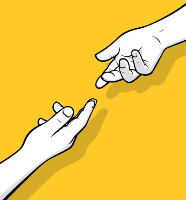 To Each Their Own
To Each Their Own
While Rag & Flag is a University-wide event, the various faculties and schools each have their own initiatives for giving back to the community as well. For example, the NUS Business School Alumni Association has its annual fundraiser, the Bizad Charity Run. The Mandatory Pro Bono Programme also requires all Singapore law students to perform at least 20 hours of pro bono work prior to graduation. “This allows students to experience how they can harness their legal skills to help the community,” says Associate Professor Ruby Lee (Law ’85). She and Associate Professor Lim Lei Theng (Law ’92) were Co-Directors of NUS’ Centre for Pro Bono and Clinical Legal Education until just recently.
The Centre runs a wide range of pro bono programmes in tandem with the activities of the NUS Pro Bono Group and the Criminal Justice Club, both led by students. This exposes them to a broad cross-section of people including migrant workers, individuals with criminal history, persons with disabilities and their caregivers, and the public at large. Assoc Prof Lim adds that it is not uncommon to see NUS Law graduates volunteering at free legal clinics and other similar schemes: “Each time we attend some sort of pro bono appreciation event, it is like an NUS reunion because we meet so many former students.”
COMING ‘LIVE’ TO AUDIENCES
In the wake of the COVID-19 pandemic, universities have had to either cancel, postpone or reconfigure
mass events. The third option was taken by a number of NUS staff earlier this year as they collaborated with faculty, students and alumni, at short notice, to turn signature events such as NUS Open Day and
NUS Career Fest into digital experiences.
Nothing quite beats the scale of NUS Open Day, which NUS’ Chief Communications Officer Ms Ovidia Lim-Rajaram (Arts and Social Sciences ’89) describes as “the single largest outreach event that showcases the University’s rich academic offerings and vibrant student life”. To maximise the reach of this year’s edition, the Office of University Communications (UCO) not only moved it online but lined up activities stretching from 26 February to 5 March — hence, NUS’ very first nine-day e-Open House.
IT training was provided to the hundreds of participating faculty, staff, students and alumni. They experimented with different approaches and platforms to produce content such as videos and e-brochures, and also hosted live sessions and attended to online queries. With no geographical restrictions, prospective students in Singapore and overseas had more time to explore NUS’ programmes at their convenience and take part in the myriad virtual tours, live chats, “Ask Me Anything” sessions, and webinars.
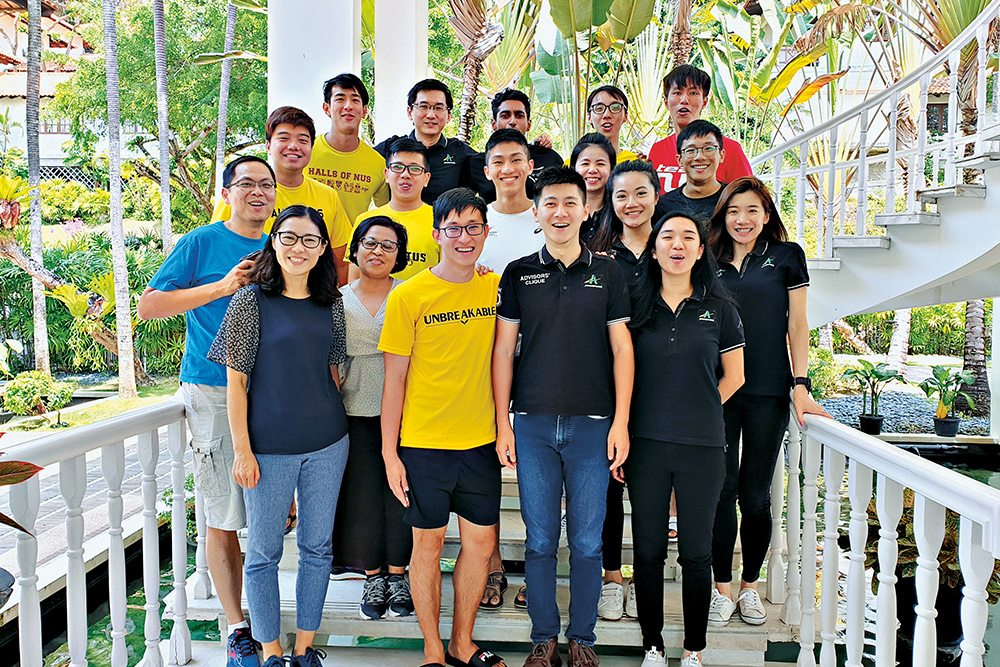 Mr Yang (front row, second from right) and members of Eusoff Alumni were invited to Eusoff Hall’s Gathering of Student Leaders.
Mr Yang (front row, second from right) and members of Eusoff Alumni were invited to Eusoff Hall’s Gathering of Student Leaders.
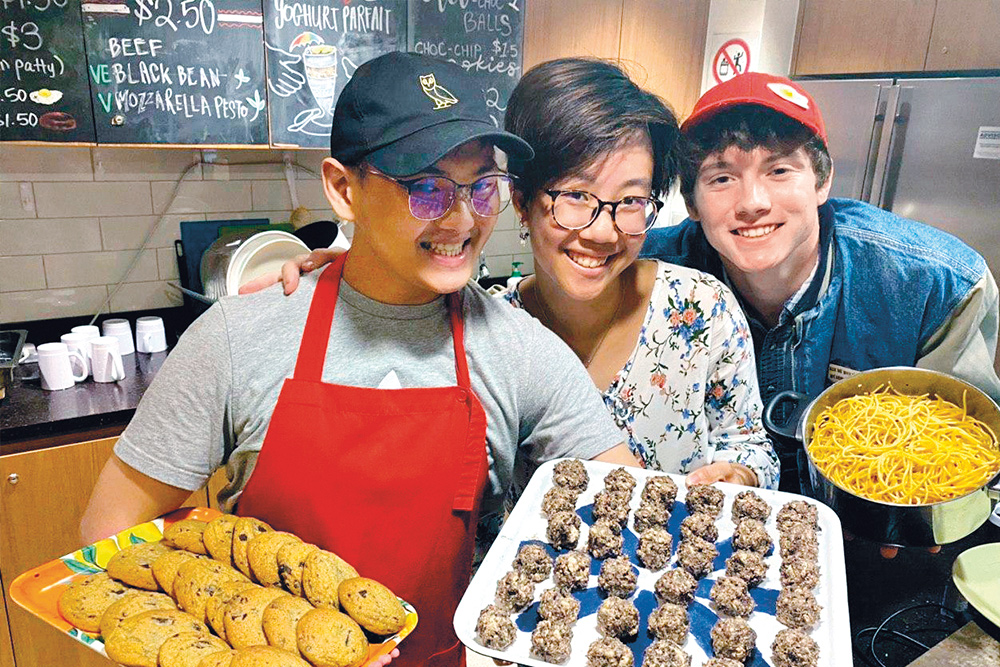 Students preparing food in Shiner’s Diner, one of the three butteries at Yale-NUS’ campus.
Students preparing food in Shiner’s Diner, one of the three butteries at Yale-NUS’ campus.
ADAPT AND ADOPT
Established in 2011, the brand-new Yale-NUS College faced a bit of a head-scratcher — how to create traditions that would resonate with students almost from the get-go. This problem was largely resolved by tapping on the existing traditions of its parent institutions, says the Dean of Students, Dr Dave Stanfield.
Why do university traditions matter?
When I think back to my undergraduate experience, the traditions were the most tangible element that distinguished my university from others. By participating in these traditions, I built a community around me and established a strong allegiance towards my alma mater.
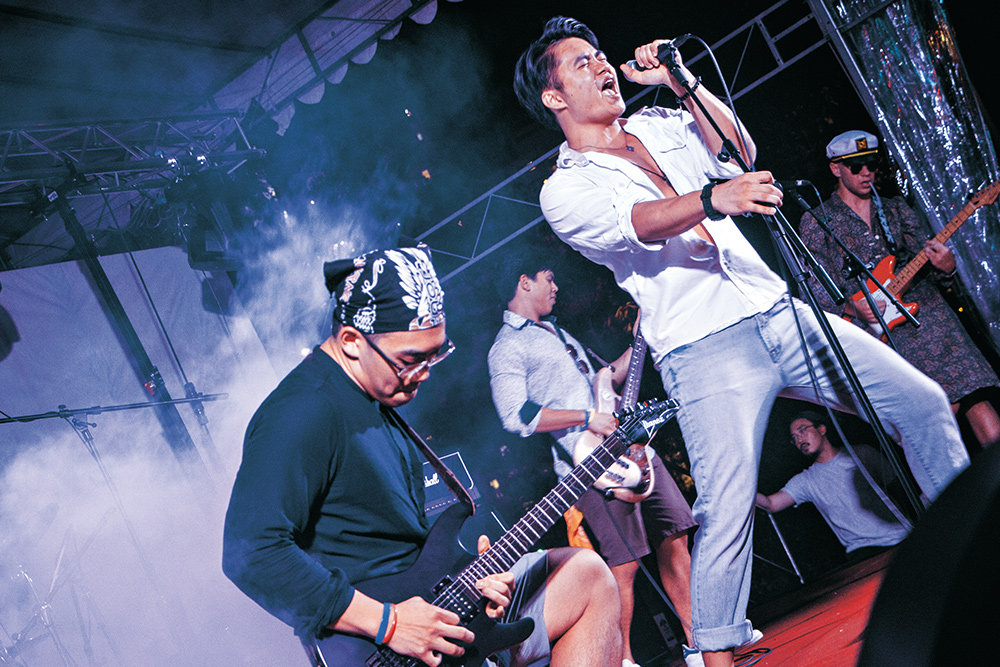 A student band performing at Tape Days.
A student band performing at Tape Days.
What are some traditions that were brought over from Yale University?
The most important tradition is our commitment to a fully residential education. Every Yale-NUS student lives on campus throughout their four years, so the student experience extends well beyond the classroom. Other traditions that we adapted from Yale include the student-run butteries, or late-night cafés, in each of our three residential colleges; and Class Day, a fun and light-hearted occasion to celebrate graduating seniors, along with close family and friends, the day before the formal graduation ceremony.
Has Yale-NUS managed to create and spread its own traditions as well?
Tape Days is one of them. It started off as a small, one-off event proposed by students to celebrate the last day of classes, and has since grown into an annual music festival. Tònes is a multilingual magazine that celebrates the range of cultures and languages represented within our highly diverse student population. There is also the popular Beach Plz; after the student group that used to organise this social event dissolved, the Dean of Students Office now helps to maintain it.
The NUS Centre for Future-ready Graduates (CFG) retooled its annual NUS Career Fest into a multi-day Virtual Career Fest from 23 March to 2 April. Synergies were leveraged between the CFG website, the Zoom platform and the NUS TalentConnect job portal to enhance the networking experience for students. New features included recruitment webinars, online guidance from CFG Career Advisors, Facebook Live morning talk shows, and one-on-one live chats with prospective employers. “We have already come a long way in transforming our career fairs over the years,” explains CFG’s Director, Ms Joan Tay. She notes that new digital tools have been introduced to provide a more “holistic” experience for students. For example, they now have access to online how-to guides and videos, as well as a resumé-critique tool powered by artificial intelligence, to support their career fair preparation. Professor Ho Teck Hua (Engineering ’85), Senior Deputy President and Provost, noted in his Career Fest welcome message: “While COVID-19
has brought about some disruption, it has also sparked innovation. The spirit of innovation has defined
NUS since its founding, so at our 115th anniversary, I am happy to see it manifested in this virtual NUS Career Fest.”
![]()
I attempted almost all categories of CCAs that the Hall offered. I tried a bit of everything and worked with all sorts of people.
Mr Yang Sheng, Chairperson, Eusoff Hall Alumni
 The NUS Career Fest Morning Show was held multiple mornings on Facebook Live. The two student hosts greeted viewers with an overview of the day ahead, useful networking tips, and a Q&A with a featured organisation.
The NUS Career Fest Morning Show was held multiple mornings on Facebook Live. The two student hosts greeted viewers with an overview of the day ahead, useful networking tips, and a Q&A with a featured organisation.
Over at Yale-NUS College, an hour-long Virtual Graduation Ceremony was held on 18 May and live-streamed via YouTube to give the Class of 2020 a creative and meaningful send-off. As many traditional elements as possible were retained and adapted to fit the digital medium, such as pre-recorded videos made by the presiding officer, guest speaker, and faculty and student representatives. The presentation
of graduands featured their individual photos while two rectors read out their names. “To make this virtual event more special, we decided to seek student contributions for the ceremony, including the playing of
the Singapore national anthem and a surprise video tribute put together by the graduating class,” adds
Ms Alyson Rozells, Yale-NUS’ Associate Director (Alumni Affairs & Strategic Events). A heartwarming video montage of well-wishes from the graduands’ families, faculty, alumni and staff was aired. Viewer interaction was also encouraged through Instagram and Facebook.
No doubt the in-person camaraderie and energy typically felt at these large gatherings were sorely missed. Despite that, the event organisers and participants made the most of the online format and put on a good show. “While we clearly treasure the special traditions that make us distinct as Singapore’s flagship University, our staff and students are also nimble and responsive. This ability to swiftly adapt, and to stay resilient, will be vital in a post-COVID-19 world,” says Ms Lim-Rajaram.
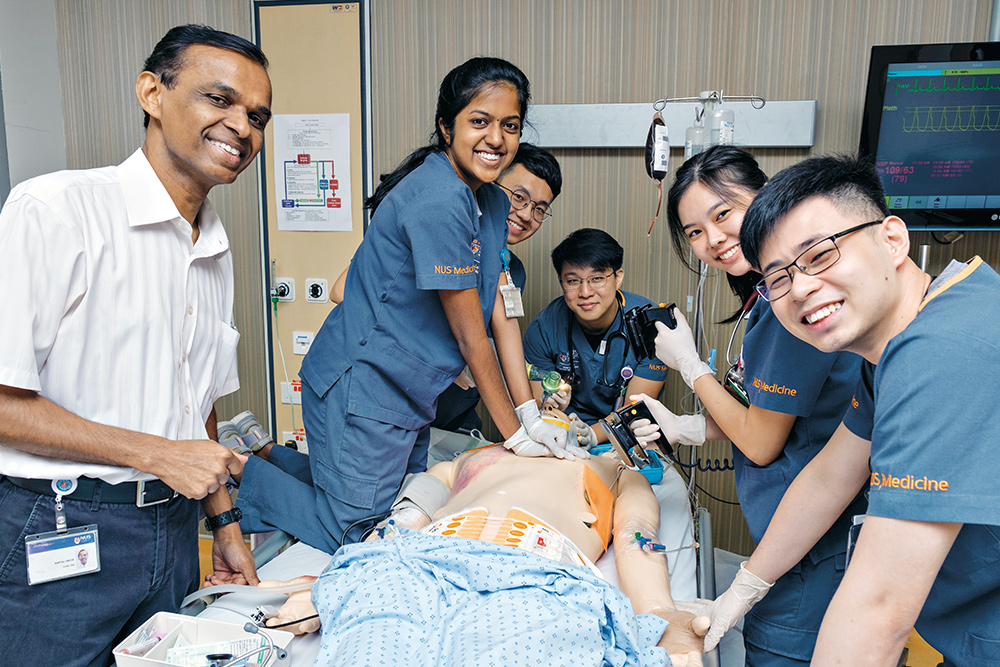 Associate Professor Suresh Pillai (Medicine ’87), Director of the Centre for Healthcare Simulation (left), and NUS Medicine students rehearsing for a live stream of an emergency room simulation for the NUS e-Open House.
Associate Professor Suresh Pillai (Medicine ’87), Director of the Centre for Healthcare Simulation (left), and NUS Medicine students rehearsing for a live stream of an emergency room simulation for the NUS e-Open House.
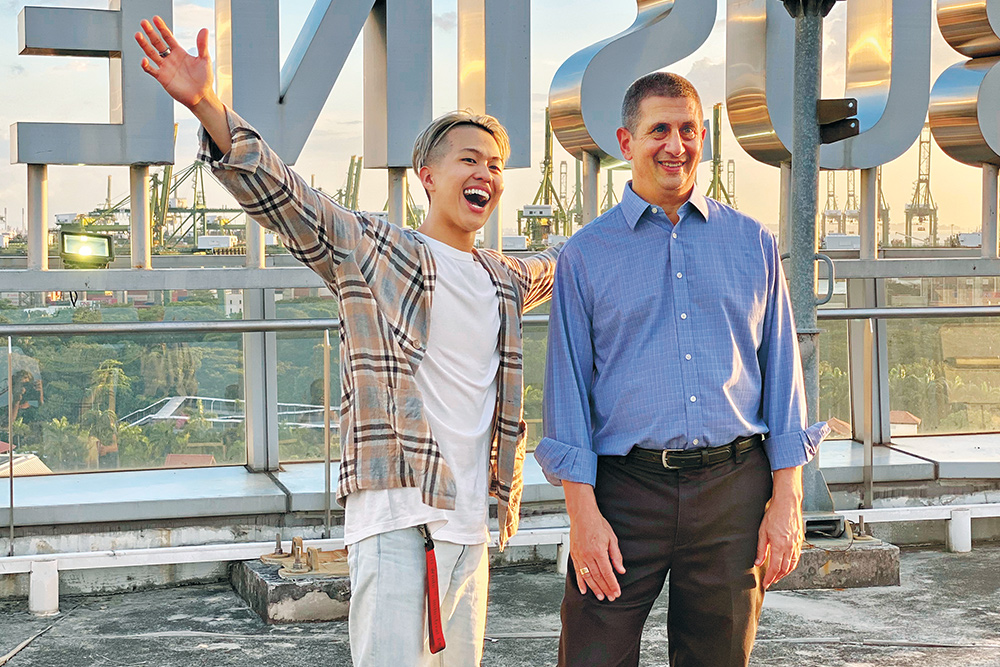 NUS Business School Dean Distinguished Professor Andrew Rose (right) and Business Year 3 student Mr Daniel Tamago appearing together in an NUS e-Open House video.
NUS Business School Dean Distinguished Professor Andrew Rose (right) and Business Year 3 student Mr Daniel Tamago appearing together in an NUS e-Open House video.
KEEPERS OF TRADITION
Without someone to keep a tradition going or adapt it to modern life, it will die out. For universities, this responsibility falls not only on students and staff, but also on alumni, young and old. Prof Lim Pin’s contributions in bringing alumni back to the University during his tenure as NUS Vice Chancellor thus cannot be overstated: “When I came onto the scene, I placed importance on strengthening relations between alumni and their alma mater. We set aside land on the Kent Ridge Campus for alumni to build
their own Guild House, and established the Alumni Affairs Office in 1989,” he says.
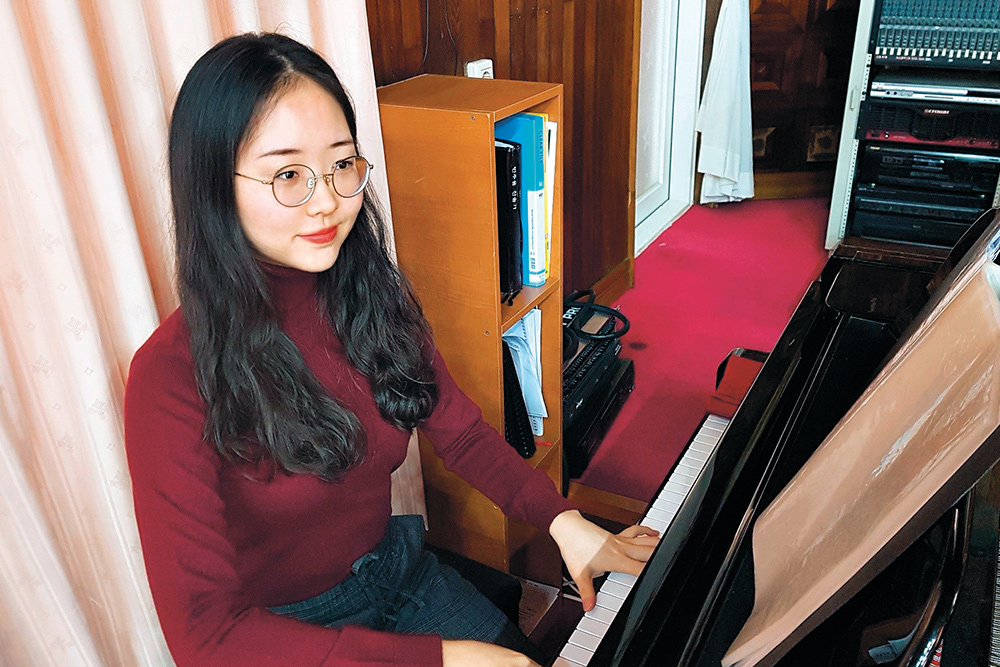 The Yale-NUS Virtual Graduation Ceremony featured a keyboard performance of Singapore’s national anthem by Ms Grace Kwak Chae Woon (Yale-NUS ’20).
The Yale-NUS Virtual Graduation Ceremony featured a keyboard performance of Singapore’s national anthem by Ms Grace Kwak Chae Woon (Yale-NUS ’20).
Those initial engagement efforts laid the foundation for the multitude of alumni-centred traditions that have emerged in the decades since. Every year, graduands collectively contribute to the Commencement Class Giving campaign, which supports juniors in financial need. Annual celebrations such as the Kent Ridge Alumni Family Day and Bukit Timah Homecoming are well-attended. Class Ambassadors organise reunions and other activities to help alumni within the same cohort stay connected with each other and the University, while Alumni Overseas Chapters perform a similar role abroad. Graduates are also free to join or start their own interest-based alumni groups.
 Mr Nathaniel Mah (Yale-NUS ’20) and Ms Grace Kwak contributed a musical performance for graduands at Yale-NUS’ Virtual Graduation Ceremony.
Mr Nathaniel Mah (Yale-NUS ’20) and Ms Grace Kwak contributed a musical performance for graduands at Yale-NUS’ Virtual Graduation Ceremony.
Mr Jeremy Ee (Engineering ’05), an NUS Alumni Advisory Board Member, breathed new life into the University’s time-honoured spirit of giving through his initiative, NUS Day of Service. Launched in 2016, this is an occasion when the global NUS community comes together once a year to volunteer for causes close to their own hearts. “Traditions speak to the soul of a community or a university. They are what people identify with, and they build a sense of belonging,” says Mr Ee. “I believe old traditions should be preserved, but new ones also need to be forged to connect with a younger crowd.”

While we clearly treasure the special traditions that make us distinct as Singapore’s flagship University, our staff and students are also nimble and responsive. This ability to swiftly adapt, and to stay resilient, will be vital in a post-COVID-19 world.
Ms Ovidia Lim-Rajaram, Chief Communications Officer, NUS
This idea that traditions must evolve in response to changing circumstances, while still upholding NUS’ core values, should strike a chord with the incoming batch of alumni, says Prof Lim. As graduands commence the next phase of their lives, the spectre of COVID-19 may dampen their excitement. But fortified by the education they have received, and the traditions they have absorbed, he remarks that there is still a lot to look forward to: “We produce graduates who are taught to try their best, adapt to changes and always look to improve. Things may not look good right now, but if you think positively and work hard, you will be able to see the opportunities and go far in life.”
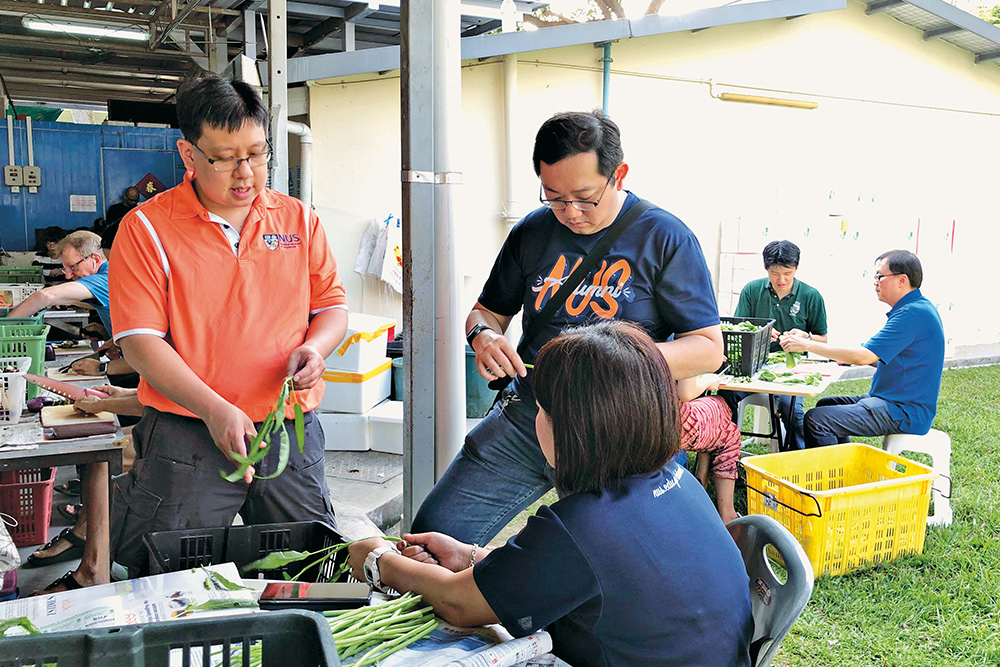 Mr Ee (left) volunteering at Willing Hearts during NUS Day of Service 2019.
Mr Ee (left) volunteering at Willing Hearts during NUS Day of Service 2019.
 MY FAVOURITE THINGS
MY FAVOURITE THINGS
Alumni from different eras share their favourite “traditions” with The
AlumNUS. Although, strictly speaking, these are personal rituals rather than full-blown traditions, the impact these have had on their lives is no less significant.
“At Raffles Hall where I lived, a bunch of us used to sit on the veranda at 4pm every day and chat over tea and biscuits. We’re all still good friends and keep in touch virtually through our ‘Raffles Hall Brotherhood’ chat group.”
Mr Jack Tan (Business ’73), Chairperson, NUS Alumni Sydney Chapter
“I used to run around the campus two or three times a week. One of my running buddies was Associate Professor Tan Lai Yong (Medicine ’85), a Resident Fellow at the College. Even nowadays, I meet up with him occasionally for a run.”
Mr Liu Guanyu (Science ’17), Class Ambassador for College of Alice & Peter Tan (2015)
